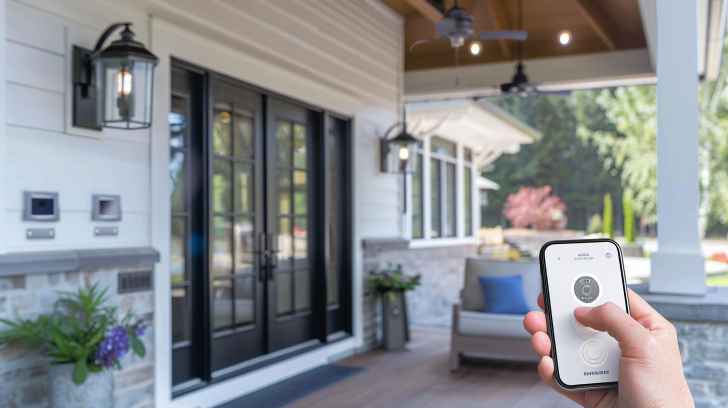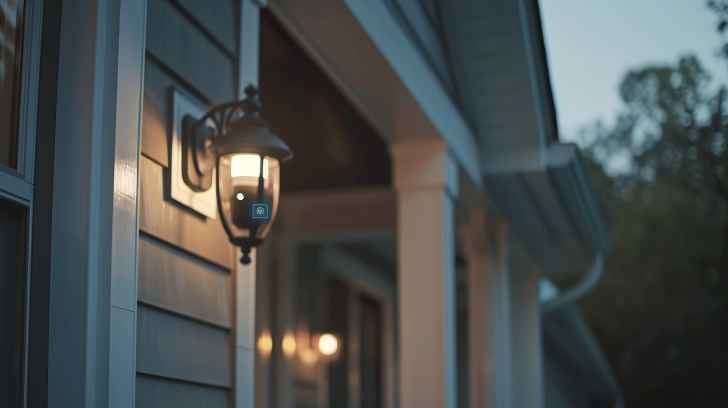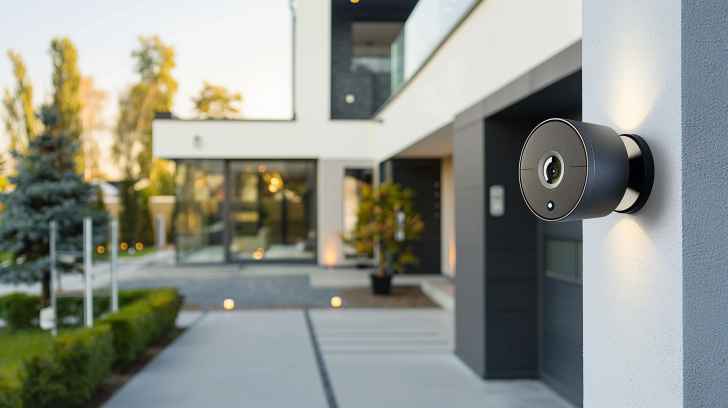Imagine making your home super safe and getting money back for it. By 2024, this is possible. Homeowners with home security systems are paying less for home insurance rates. More people are using surveillance cameras, smart locks, and full alarm systems.
Insurers are noticing and giving big insurance discounts for home protection. This movement is not just about saving money. It’s also about improving home safety and increasing peace of mind.
The link between security technology and low insurance premiums is clear. Data shows that risks are lower and crime is prevented. Smart home security systems offer layers of protection. They use motion sensors, door locks, window sensors, and security lighting. These technologies are effective in stopping crimes. So, insurance companies are offering discounts for DIY security systems, wireless security, and tamper-proof devices.
Home automation and remote monitoring add more safety. They come with carbon monoxide detectors, smoke detectors, and water leak detectors. Nowadays, professional monitoring services change how we protect our homes. This blend of security and tech leads to real insurance savings for homeowners.
Key Takeaways
- Investing in modern home security technology can lead to reduced home insurance premiums.
- Insurance discounts are more accessible to homeowners with security systems that prevent theft and other risks.
- Smart home security features, including motion sensors and advanced locks, enhance home protection and safety.
- Insurance savings are a compelling reason for homeowners to consider upgrading to insurance-approved security systems.
- Technological advancements in security offer not just loss prevention, but also essential peace of mind for homeowners.
The Impact of Advanced Home Security on Insurance Premiums
Homeowners are constantly looking for ways to make their properties safer and more cost-effective. Having advanced security systems is key in doing so. They not only promise home security discounts but assure homeowners of proactive protection. This makes the case for upgrading to high-tech security more appealing.
Why Insurers are Offering Discounts for Security Tech
Insurance companies recognize that homes with the latest security tech are less likely to have incidents that lead to claims. Insurers view risk mitigation as crucial, regarding proactive protection as essential. To encourage homeowners to install these technologies, they offer discounts on insurance premiums.
The Statistics: How Much Can You Save?
| Type of Security Tech | Average Premium Reduction | Impact on Claim Frequency |
|---|---|---|
| Comprehensive Alarm Systems | 20% | Reduction by 25% |
| Environmental Monitoring | 10% | Reduction by 15% |
| Smart Home Integration | 15% | Reduction by 20% |
The data highlights the dual financial benefits of integrating security systems. You save money on premiums and reduce the chances of needing to file claims.
Testimonials: Real Savings from Real People
“Installing a state-of-the-art security system helped reduce our annual insurance costs by over 18%, turning a necessary expenditure into a cost-saving investment.” – Homeowner in San Diego, California
“Thanks to our advanced surveillance system, our insurer lowered our premiums and we feel more secure. It’s a win-win!” – Property Manager in Miami, Florida
Consumer experiences show the real benefits of security upgrades. They prove how modern technology can bring both security and savings to life.

Rising Trends in Home Security Technologies for 2024
The home security scene is changing fast, thanks to cutting-edge technology and innovation in protection. By 2024, homes will have better incident response and advanced surveillance. This is all thanks to AI-driven security and smart integration of gadgets.
One big change is biometric systems. They use facial recognition and fingerprints for safer access. This lowers the chance of break-ins. Plus, pairing these with AI tech makes them even smarter. They give alerts and can predict break-ins before they happen.
These upgrades do more than just make homes safer. They change how people control their security. Through smart integration, managing security becomes a breeze. This means everything works together and can be controlled from anywhere.

Predictive analytics are now key, using lots of data to foresee security issues. This way, homeowners can stop problems before they start. It’s all about being one step ahead.
| Technology | Benefits | Example Applications |
|---|---|---|
| Facial Recognition | Enhanced personalization and improved security | Entry systems, personal device access |
| AI-Driven Security | Real-time threat detection and automated incident response | Surveillance cameras, alarm systems |
| Predictive Analytics | Anticipation of security breaches, enhanced preparedness | Security trend analysis, customized alert systems |
| Smart Integration | Unified control and streamlined security operations | Smart home hubs, integrated security apps |
As these security trends evolve, focus is shifting. Now, it’s about more than stopping incidents. It’s about a smart, unified response. This move towards innovation in protection is shaping the future of home security.
Conclusion
We’ve seen how technological advancements and insurance rate benefits are changing home security and personal finance. Homeowners are making their places safer and saving money on insurance. This shows how important it is to make smart choices about home protection’s future.
Security technology does more than stop burglars. It’s a full plan for lowering risks. By using the newest security measures, homeowners can get big insurance discounts. This not only helps them but also makes neighborhoods safer by cutting down on crimes.
Empowered homeowners who stay updated and use new tech will lead in safety and smart spending. This article has shown that investing in modern home security is wise. It protects your home and may also save you money. Home security keeps getting better, offering more protection and chances to save.
FAQ
How does home security technology affect home insurance rates?
Insurance companies often lower premiums for homeowners with advanced home security systems. Devices like burglar alarms and surveillance cameras mean less risk of theft and damage. This leads to savings on insurance costs.
What types of security technology can lead to insurance discounts?
Discounts may be offered for smart home systems, burglar alarms, cameras, and more. Motion sensors, advanced locks, and environmental detectors are also included. These technologies help make homes safer.
Can smart home automation contribute to lower insurance premiums?
Yes, integrating security features through smart home automation can lower premiums. It provides comprehensive protection and allows for easy monitoring. Insurers often give discounts for these systems.
Are DIY security systems recognized by insurance companies?
DIY security systems are accepted by many insurers. They must meet certain standards and may need professional monitoring for discounts. It’s important to check if they qualify.
How significant are insurance savings with the addition of security technology?
Savings can be big, with up to 20% off premiums for some. Yet, most homeowners see a 5% to 15% reduction. It varies by insurer and technology used.
Will the addition of biometric systems like fingerprint and facial recognition door locks offer more insurance benefits?
Biometric systems offer more personalized security, which insurers like. They can deter unauthorized access well, leading to bigger discounts on insurance.
Are wireless security systems effective in lowering insurance premiums?
Yes, especially tamper-proof systems with professional monitoring. Insurers view them as good for reducing theft and damage risks. This can lower your premiums.
Do insurance companies require security devices to be professionally installed?
Some insurers prefer professional installation for discounts. It ensures devices work correctly. But, not all companies require this for discounts.
What is ‘insurance-approved security’ and how is it different?
It means systems meet insurer’s standards for deterring crime. ‘Insurance-approved’ systems are more reliable and can get you higher discounts than standard ones.
Can security systems help in crime prevention and home safety?
Absolutely. They scare off burglars and alert of intrusions. With alarms and cameras, homes are safer and less appealing to criminals.
Is remote monitoring an important feature for insurance discounts?
Yes. Remote monitoring lets you watch your home from afar. Insurers give discounts for this, as it helps in quickly spotting and responding to incidents.
How does adding environmental detectors like carbon monoxide and smoke detectors affect home insurance?
Environmental detectors lower the risk of fire or gas leak damage. This makes homes safer, which insurers reward with lower rates.






